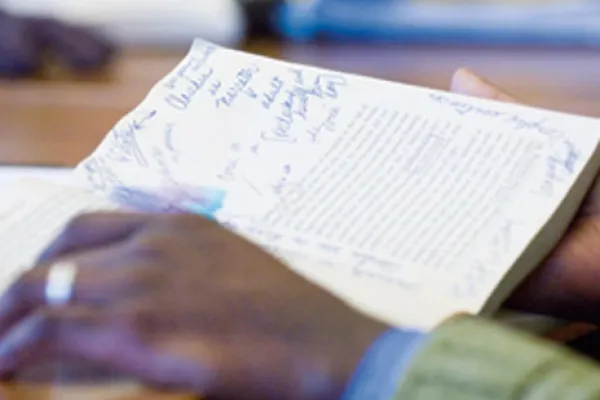Fostering Learning, Inspiring Achievement: Three Faculty Members Chosen for 2015 Sherrerd Teaching Awards
News of Note

Published April 20, 2015
High standards, a talent for making abstract concepts real to students, and championing classroom innovation are among the qualities displayed by three faculty members chosen for the 2015 Kathleen Compton Sherrerd ’54 and John J. F. Sherrerd Prizes for Distinguished Teaching.
The 2015 prize recipients are Justina Gregory ’67, Sophia Smith Professor of Classical Languages and Literature; Sara B. Pruss, associate professor of geosciences; and Alan N. Rudnitsky, professor of education and child study.
The three were chosen based on nominations submitted by Smith students, faculty and alumnae.
The annual awards were established in 2002 by a contribution from the late Kathleen Sherrerd ’54 and John Sherrerd to highlight the college’s ongoing commitment to outstanding teaching. (View a list of past Sherrerd Award winners.) The honors are given to faculty members who display superior skill in fostering learning and inspiring achievement—both in and out of the classroom.
This year’s award recipients will be formally recognized at an October 21 ceremony and reception which are open to the campus community.
Following are brief biographies of the 2015 teaching award winners:
Justina Gregory ’67
Justina Gregory, Sophia Smith Professor of Classical Languages and Literatures, has been teaching at Smith since 1975. She teaches Greek and Latin at all levels, as well as classics in translation courses such as “Women of the Odyssey.” “A scholar whose research centers on Greek tragedy and intellectual history, she has received Woodrow Wilson, Fulbright and American Council of Learned Societies fellowships for her work. She delivered the Engel Lecture at Smith in 2010. Students cite Gregory’s ability to make the classics exciting and meaningful, along with her kind and patient support, as among the reasons she is deeply respected at Smith. Gregory “has inspired me to be a better student and has made the ancient world come alive,” wrote one student. Colleagues say Gregory is adept at adapting her teaching style to reach students across generations, as well as each class within a semester. She is able to pair rigor in her teaching with an abiding respect for her students’ ideas. Gregory, the author of monographs on Euripides and the editor of A Companion to Greek Tragedy, is currently completing a book on concepts of education in epic and tragedy. She holds an undergraduate degree from Smith and a doctorate from Harvard University.
Sara Pruss
Sara Pruss, associate professor of geosciences, has been a member of the Smith faculty since 2007. Her teaching and research interests cover invertebrate paleontology, marine science and the history of life on earth. She has been featured in two National Geographic television programs and has recently been involved with field research projects in northern Namibia, Death Valley and Newfoundland. In the classroom, colleagues say Pruss excels at encouraging students to think like scientists. She is able to take challenging, abstract scientific concepts and make them real for students, so that even non-science majors are engaged with the material. As one student wrote, “I am a studio art major, but taking Professor Pruss’ oceanography course made me want to study paleontology, oceanology and all other subtopics.” As faculty director of Smith’s Achieving Excellence in Mathematics, Engineering and Science (AEMES) mentoring team, Pruss has helped inspire students from diverse backgrounds to enter STEM fields. Pruss earned her undergraduate degree from the University of Rochester and a master’s degree and a doctorate from the University of Southern California. After earning her Ph.D., she was an Agouron Institute Postdoctoral Fellow at Harvard University.
Alan Rudnitsky
Professor of Education and Child Study Alan Rudnitsky began teaching at Smith in 1976. His research focuses on numerous key aspects of learning, including how teachers create learning communities, the role of imagination in teaching and learning, and discourse as a method of transforming classrooms. Smith colleagues describe Rudnitsky as “a champion for big ideas and deep learning in the classroom”—someone who has influenced fellow faculty members to think deeply about student engagement and understanding. Rudnitsky is also known for innovative techniques in his own classroom. As one Smith faculty member wrote, “Al is truly helping transform the classroom experience of Smith students. His goal is always to promote deep, idea-centered learning with a focus on keeping students and student work at the center of his classroom.” Rudnitsky is co-principal investigator for a National Science Foundation-funded project on “Using Narrative in a Digital Learning Environment to Engage Children and Teens in Engineering.” He earned an undergraduate degree from Drexel University, a master of education degree from the University of Massachusetts Amherst and a doctorate from Cornell University.